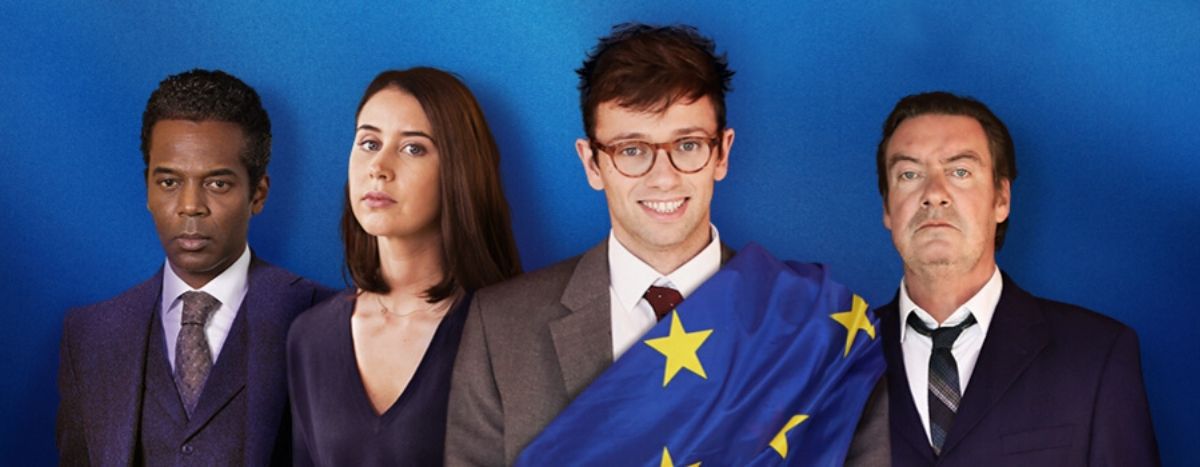
'Parlement': The TV series making the EU sexy
Published on
Translation by:
Anna W.The EU - a subject often shunned by the national media channels - is the star of a new series on France TV’s digital streaming platform. The show follows Samy, is a new assistant at the European Parliament, surrounded by political disputes and romantic dalliances, who discovers the institution alongside us. But does Parlement manage to make the EU interesting?
“The President has given you a free report for your first day.” When Samy, a young, French parliamentary assistant newly arrived in Brussels, attends his first Parliamentary Committee meeting, he’s tricked by a seasoned assistant who lumbers him with the task of drafting of a report on fisheries. Samy quickly realises that he’s in over his head. Neither he nor Michel, the Member of Parliament he’s assigned to, have the slightest idea how to write the report. And so begins his foray into the jungle of the European Parliament to find himself some useful allies.
The series, broadcast on France TV’s digital streaming platform as ten 26-minute episodes, was conceived by the public channel as a comedy to make the EU's technocracy easier to digest. According to a study conducted by the The Fondation Jean-Jaurès, traditional TV news channels dedicated just 2.7% of their programming to stories relating to European institutions in 2018. Sened Dhab, Director of Digital Scripted Content at France TV, says: “By aiming above all to be funny and entertaining, the series discusses Europe in a much less uptight way than we’re used to hearing.”
Europhile, or just European?
The series was created by Noé Debré with the support of the EU’s Creative Europe MEDIA programme. Previously, Debré enjoyed success with his scripts for Jacques Audiard’s ‘Dheepan' and Mathieu Sapin’s ‘We Need Your Vote’. Born in Strasbourg and a true European at heart, Debré wanted to depict the “bull ring” of the European Parliament. Though the series paints Europe in a positive light on the whole, he says he prefers to avoid “preaching” about the virtues of the EU project.
“We didn’t make this series to convince people that Europe is great,” says Debré. As far as he’s concerned, ridiculed pro-Brexit MEPs (Member of European Parliament) and nationalist leaders are a great source of comedy. “We’ve got EU members in favour of Brexit and the situation that ensues is full of comedic potential. That’s what inspired us to write the show.” Sened Dhab doesn’t hide the fact that his decision to make the series stemmed from a desire to show more of Europe. “We are all European citizens and our whole creative team has grown up with the EU. We see all the advantages it can bring, along with its slightly onerous and often Kafkaesque sides. But the plan was always to have a deeply Europhile series.”
The show sets to "highlight the human experience over calculations and political complexity.”
“How am I going to be able to talk for 1 minute and 30 seconds?" Michel Specklin from the show exclaims, about presenting his report in front of the Commission. As a French centrist MEP, he is in favour of putting in as little effort possible when it comes to parliamentary tasks. However, his bumbling character, played by Philippe Duquesne, inspires more sympathy than dislike. As his assistant, Samy (Xavier Lacaille) struggles with shrewd lobbyists and opposition strategists in order to get his report passed. With very little experience in the field, he hopes to get by on charm and smooth talking.
Filmed on site at two European institutions, Brussels and Strasbourg (in the Parliament but also in regional Committees), the “politically incorrect” series shows the ecosystem of the European Parliament and tells its anecdotes through wacky characters and situation comedy. We see “coffee tractors”, nicknamed as such after the shape of their chairs. The show also references the European Parliament’s famous Mickey Mouse Bar in Brussels, which, too, draws its name from the shape of its seats.
Entertainment rather than politics
With a protagonist who falls under the charm of an extreme right-wing assistant, forms false allies and budding friendships, the series uses heartwarming story lines and characters with traits designed to endear them to the viewer. Whether clumsy, inept or overly-confident, each protagonist has a likeable side and their intentions are more often good than bad. We’d almost forgive a British pro-Brexit MEP’s incompetence after watching him complete a 50 piece puzzle. Sened Dhab says that the show sets out to “highlight the human experience over calculations and political complexity.”
For him, it’s not about stigmatising the officials, MEPs and parliamentary assistants. Noe Debré adds: “It’s a comedic process. Watching Michel, the MEP, is like watching a Pierrot. But he needs to be like that for Samy to find himself in a position of full responsibility. It’s interesting to watch someone who has to learn to do everything alone. There are other officials in the show who are competent, so I hope we’re not giving the impression that incompetence is the norm.”
To faithfully represent the European Parliament and its workers, Noé Debré was guided by two authors who had spent several years there and know it well. One of them, Maxime Calligaro, a former parliamentary assistant and current policy advisor to Parliament, published his book Les Compromis last year. The story takes place at the European Parliament, and, like Parlement, it reveals behind-the-scenes insights about power as part of its intrigue.
By mixing comedy and informative content, does the show stand a better chance at reaching a wider audience that just the officials, assistants and interns in the European bubble? A bold wager, perhaps, considering the complexity of these institutions. But this recipe of humour may well be the right one to finally popularise European issues and restore some truth to misconceptions.
Series 1 of Parlement is available for free on France TV.
Cover photo : France TV
Translated from « Parlement », la série qui rend l'Europe sexy



